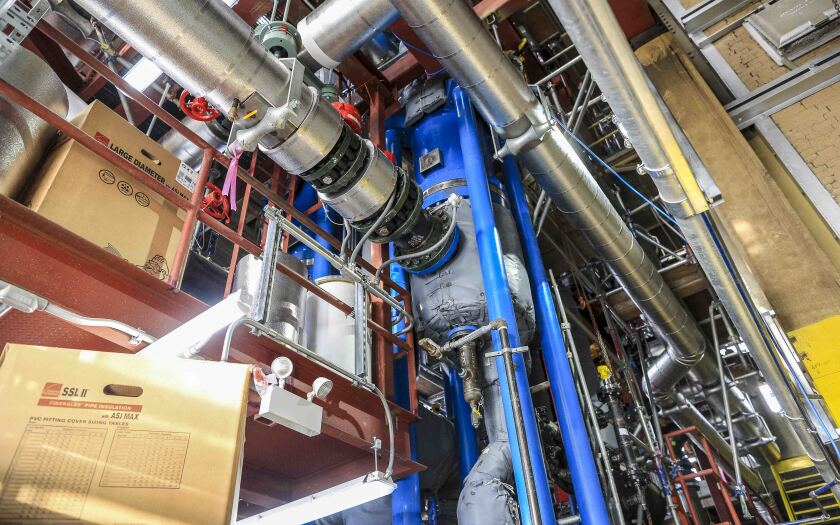The decision to convert from steam to hot-water heat was an easy one for Steve LaFlamme, president and CEO of Oneida Real Estate Services. In all, LaFlamme has chosen to replace steam with hot-water heating systems in four of the downtown Duluth buildings his firm owns or manages: the Northland Building, the Stanley Center, the Beal Building and the Wells Fargo Center.
Duluth Energy Systems completely financed the cost of converting the buildings, which Oneida will pay off over the next decade. But even with those finance costs baked into the bill, LaFlamme said his monthly heating costs have dropped from last year.
Terry Nanti, general manager of Duluth Energy Systems, operated by Ever-Green Energy, said everyone who has made the switch is already reaping savings, and when the cost of system upgrades are paid off in another 10 years, those customers will see the financial benefit magnify.
Not all downtown buildings are readily adaptable to hot-water heat, however.
LaFlamme noted that the Sellwood Building, the Medical Arts Building and the Alworth Building all remain on steam due to their age and the configuration of their heating systems.
ADVERTISEMENT

"The radiation systems in some of our older buildings are meant for steam, and you just can't put hot water through them," said LaFlamme, explaining that the cost to convert those structures would be prohibitive, an assessment confirmed by staff at Duluth Energy Systems.
The Greysolon Plaza Building also was deemed an unsuitable candidate for conversion, according to Nanti.
Nanti said heating with hot water instead of steam is far more efficient, typically consuming about a quarter less energy, as measured in British Thermal Units.
Those savings translate into even more attractive heating bills, because, as Nanti pointed out: "Hot-water BTUs are 30% cheaper than steam BTUs. So, their energy bill actually decreases, because the cost of that energy is so much cheaper."
Unlike the steam system, the hot-water system operates as a closed loop. By the time water returns to the plant from its network of customers, the temperature has dropped a bit, but it takes a relatively modest amount of energy to reheat the returning water, versus bringing cold water up to temp from scratch.
ADVERTISEMENT

In all, 27 buildings in downtown Duluth have made the switch from steam to hot water.
"It's an easy sell. In just about every case where they were able to, people have converted," Nanti said. "We've got all the viable candidates converted or soon-to-be-converted along the Superior Street network. The next step is to look at what makes the most sense for the system."
"We're not going to just connect a customer because they would like to be connected," he said. "We need to connect customers that give us the ability to improve redundancy, resiliency or eliminate assets. So, for instance, we might reach out to a customer in the future and connect them to hot water because we can sunset a block or two of steam line. That will be how the system gains in efficiency moving forward with the infrastructure that we have in place now."

To date, Duluth has invested a little more than $30 million on the hot-water system, with costs coming in a little lower than initially anticipated, according to Nanti. The installation of the new closed-loop system was timed to coincide with the multi-year reconstruction of Superior Street. As a result, some of the customers have yet to link into the centralized finished network. Instead, a smattering of customers remain hooked into remote temporary boiler systems.
The city's hot-water system also is appropriately sized to accommodate growth, including new facilities St. Luke's and Essentia Health are working to bring online, and Nanti said Duluth Energy Systems has long-term contracts with both health care providers. But St. Luke's and Essentia will continue to use steam, as well, to maintain backup redundancy and for equipment sterilization purposes.
ADVERTISEMENT

Mindy Granley, Duluth's sustainability officer, said: "In terms of performance, I don't think we'll know for a while how much we can really save, because everything that Terry was talking about sort of on the east side that has just been completed will be commissioned and started up after the new year.
"Then, a year from now, we'll be able to look back and see how those bills changed," she said.
Granley said the improved efficiency of the platform also is incentivizing the city to look at different fuel alternatives.
Nanti said Duluth Energy Systems has been able to largely wean itself off coal, switching primarily to cleaner-burning natural gas.
"We're probably using about 10% of the coal we were consuming just a decade ago, and the next step will be moving to renewables," he said.
Toward that end, Duluth Energy Systems has an agreement to convert a boiler for use of a biofuel made of wood waste, but regulatory hurdles that would open the door for energy credits have slowed up that transition.
ADVERTISEMENT












